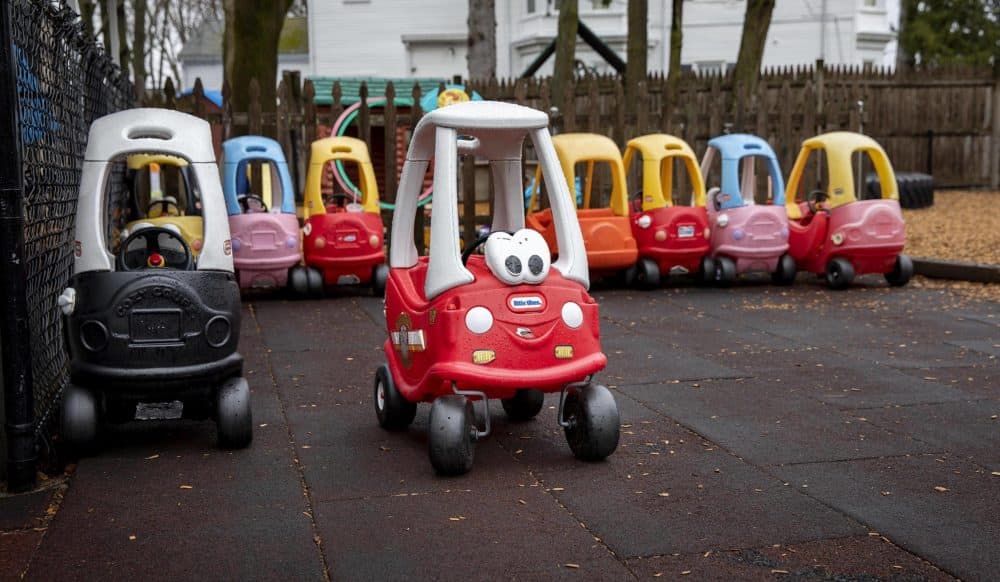Advertisement
Extended Closures Could Mean Some Mass. Day Cares Never Reopen

Day care providers in Massachusetts, already ordered closed since March 23, could struggle to ever reopen unless they can get more aid, according to early childhood advocates.
Gov. Charlie Baker announced that schools and non-emergency day care programs would remain closed through June 29. Even as it's the necessary decision for public health, advocates say lengthening the closure puts a strain on an already fragile system of care with thin operating margins.
Advocates estimate about half of the child care market in Massachusetts is funded directly by individuals and families, many of whom are facing loss of income and other uncertainties.
"We know that programs need those dollars to survive," said Amy O'Leary, director of the Early Education for All campaign with the group Strategies for Children. "I'm worried that we're going to come to a point where programs just cannot continue to stay open without some serious investment.”
O'Leary and others said they've heard anecdotally that a handful of providers are not planning to reopen, something WBUR could not immediately verify. Massachusetts is creating a formal process to track any permanent closures.
According to the National Association for the Education of Young Children, 27% of child care providers surveyed in Massachusetts last month said they would not survive a closure of more than two weeks, "without significant public investment and support." Nationally, half of care providers said they would be in that same position.
"The financial model for early education and care has been broken for a long time," O'Leary said. "The crisis that we're in right now is really highlighting the inequities of our system and that we have not considered early education and care a public good in the same way that we think about kindergarten through 12th grade."
Providers who rely on state and federal subsidies are still receiving those funds, and the federal CARES Act included $3.5 billion dollars for the Child Care and Development Block Grant and $750 million for Head Start.
Advertisement
In addition, Massachusetts is continuing to pay providers subsidies — and covering the portion parents who receive subsidies are usually responsible for. The state is basing those subsidies on pre-pandemic enrollments. That's estimated to cost the state between $45 to $60 million a month during the coronavirus closure.
Child care providers are also eligible to apply for the federal Paycheck Protection Program, which ran out of funding after two weeks. On Tuesday, the state launched a partnership with the Children’s Investment Fund to provide help for early educators applying for the program.
Some group programs are still open for children of essential workers. As of Tuesday, 523 emergency child care programs in Massachusetts were serving an average of 2,500 children per week. The state has also launched a partnership with Care.com to help connect essential workers with nannies or babysitters.
State officials, advocates and care providers are trying to figure out how to safely reopen and when. They're also looking to adapt to potential changes in what families need or want from child care in two months or more.
"I can't tell you the number of people who have been constantly thinking about what it might look like to reopen," O'Leary said. "What would it look like to make sure that children are safe? What might it look like to to better serve children and families in programs and make sure that parents feel comfortable?"
State officials said they are developing a "phased approach" for reopening child care programs and schools. It's an intricate challenge to assess public health safety and family, business and educator needs.
"Parents cannot go back to work if their children are not safely cared for," Early Education and Care Commissioner Samantha Aigner-Treworgy said Tuesday. "Educators cannot go back to work if proper preparations and protocols aren't in place. Programs cannot reopen if meaningful policies, guidance and support is not there for them. And businesses cannot reopen if their employees don't have safe, high quality child care to send their children to."
At the same time, advocates see the potential to address systemic challenges that have lead Massachusetts to have second highest child care costs in the nation, after Washington, D.C.
"We have an opportunity to rebuild a stronger child care and early education system — one that creates a stable business model for providers and ensures affordability for families," said Lauren Kennedy, co-founder of the group Neighborhood Villages.
That would require a large-scale investment of federal dollars.
